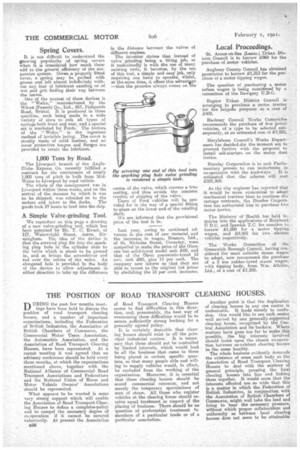THE POSITION OF ROAD TRANSPORT CLEARING HOUSES.
Page 8

If you've noticed an error in this article please click here to report it so we can fix it.
URING the past few months meet
ings have been held to discuss the position of road transport clearing houses, and a number of important organizations, including the Federation of British Industries, the Association of British Chambers of .Comenerce, the Commercial Motor Users Association, the Automobile Association, and the Association of Road Transport Clearing Hemeea, have been represented. At a recent meeting it was agreed that an advisory conference should be held every three months, at which the organizations mentioned above, together with the National Alliance of Commercial Road Transport Associations and Federations and the National Union (A Horse and Motor Vehicle Owners' Associations should be represented.
What appears to be wanted is some very strong aupport which will enable the Association of Road Transport Clearing Houses to define a completesTolicy and to compel the necessary degree of co-operation if it cannot be secured voluntarily. At present the Association 1126 of Road Transport Clearing Houses seems to find difficulties in this direction, and; presumably, the best way of overcoming these difficulties would be to secure sufficiently strong backing for a generally agreed policy.
It is certainly desirable that clearing_ houses should exist in all the principal industrial centres. It is necessary that these should not be controlled by limited interests, which would lead to all the business that came to them being placed in certain specific quarters, so that many people able and willing to supply vehicles would, in effect, be excluded from the working of the organization. Moreover, it is essential that these clearing houses should be sound commercial concerns, and not merely the temporary speculations of men of straw. All those who register vehicles at the clearing house should receive equal treatment in respect of the placing of business. There should be no -question of preferential treatment to members of a particular trade or of a particular association. Another point is that the duplication of clearing houses in any one centre is undesirable. It lead.s merely to confus sion. One would like to see each centre , well served by one generally-supported clearing house,• recognized by the Central Association and itgbackers. Where matters have gone too far to make this
the big interests involved' should insist upon the closest co-operation between co-existent clearing houses in the same locality.
The whole business evidently demands the exietence of some such body as the ' Association of Road Transport Clearing Houses to deal with the matters of general principle, pressing the local clearing houses into line and linking them together. It would seem that the interests affected are.se wide that. this . is a matter in which the Federation of British Industries, in conjunction, with the Association of British Chambers of Commerce, might well take the lead and bring to bear the necessary pressure, without which proper collaboration and uniformity as between local clearing houses does not seem to be attainable.




































